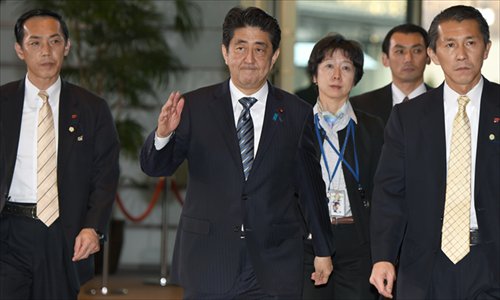Abe taps ‘hawkish’ defense minister
PM’s new term expected to be assertive

Shinzo Abe waves to journalists upon his arrival at his official residence in Tokyo after being re-elected as Japan's prime minister at parliament on Wednesday. His return to power prompted warnings from China over a possible bid to change Japan's pacifist constitution. Photo: AFP
Japanese Prime Minister Shinzo Abe's re-election by parliament on Wednesday is set to "provide room" for his more assertive security stance with regard to Sino-Japanese relations, said analysts.
Abe secured his seat after an expected election victory on December 14, extending his term until 2018. His third cabinet, sworn in on Wednesday, has remained unchanged apart from the appointment of a more hawkish defense minister.
The new minister, Gen Nakatani, 57, briefly served in the armed forces. He is a former defense minister who favors Japan having the ability to hit enemy bases preemptively in the face of imminent attack, reported Reuters.
Abe's new cabinet is composed mostly of his political allies, which according to observers will give him full control in continuing his economic reforms and flexing Japan's military muscles.
"Japan's military strategy has been set with an eye on China," said Liu Jiangyong, vice dean of the Institute of Modern International Relations at Tsinghua University.
"The reason why original defense minister Akinori Eto was replaced may not be as simple as his problematic use of political funds, especially after the Abe administration's recent attempt to revise the Guidance for US-Japan Defense Cooperation," he told the Global Times.
Revising the guidance would allow Japan to expand the range of the two countries' joint military operations.
Although often portrayed as a nationalistic hawk, according to The Japan Times, Abe has pledged to prioritize his "Abenomics" policies - an economic policy of aggressive monetary easing, greater fiscal spending and structural reforms.
However, Yang Bojiang, deputy director of the Institute of Japanese Studies at the Chinese Academy of Social Sciences, expressed doubts over Abe's priorities, as he argued that Abe is more interested in his legacy in security and historical issues rather than economic and social policy.
"Abe's economic revival policy only aims to give room for his security policy," Yang told the Global Times, citing the plans to revise the pacifist constitution and preparing legislation for the implementation of collective self-defense as proof of Abe's long-held ambitions.
Abe vowed after the general election that he and his ruling Liberal Democratic Party (LDP) will make renewed attempts to win public support for his controversial plans to submit bills in late January to expand the scope of the Self-Defense Forces allowing troops to act in collective self-defense. He also wants support to pass a law in 2015 to reinterpret Japan's pacifist constitution which would pave the way for its troops to fight overseas for the first time since World War Two.
Sino-Japanese relations sunk to a new low after the Japanese government announced it would "nationalize" the Diaoyu Islands on the East China Sea in September 2012. The tension continued in the past two years with Japan under Abe's rule.
The relations saw "no improvement at all" even after Chinese President Xi Jinping met with Abe in Beijing in November on the sidelines of the Asia-Pacific Economic Cooperation summit, according to Kyodo News.
Hua Chunying, a spokesperson for China's foreign ministry, on Wednesday urged Japan to "go with China toward each other," in particular with the implementation of the newly reached four-point agreement on developing Sino-Japanese relations.
China and Japan reached the four-point agreement in November when they agreed to resume political, diplomatic and security dialogue, while acknowledging different positions on the Diaoyu Islands.
Yang said he remains skeptical about Abe's ability to achieve both his economic and security policies.
"It will take more than four years to solve Japan's deep-rooted economic problems, which requires a prolonged period of structural reforms," he said.
Abe's administration in April implemented a higher sales tax to boost government revenue, but this policy was seen to have backfired and has been blamed for the recent slump. He announced a further sales tax hike would be put on hold before the election.
As for Abe's ambition to revise the pacifist constitution, according to Yang, political hurdles remain high to holding a national referendum, which requires the support of more than two-thirds of both lower and Upper House members, followed by approval of more than half of the electorate.
Despite its election victory, public support for the new cabinet has been lukewarm with turnout at a record low 52.66 percent, which Yang reasoned was due to a lack of alternative choices in political parties stronger than Abe's LDP.
Yang believes cooperation between China and Japan, Asia's two largest economies, will be essential and beneficial to ongoing economic reform in both nations, providing both with incentives to improve ties.
But Liu believes that political and strategic issues still have a dominant role to play in improving bilateral ties.
"Apart from uncertainty of whether Japan will implement its security policy, China and Japan will need to agree on issues involving the Diaoyu Islands disputes, and both sides' perspective of history," Liu noted.